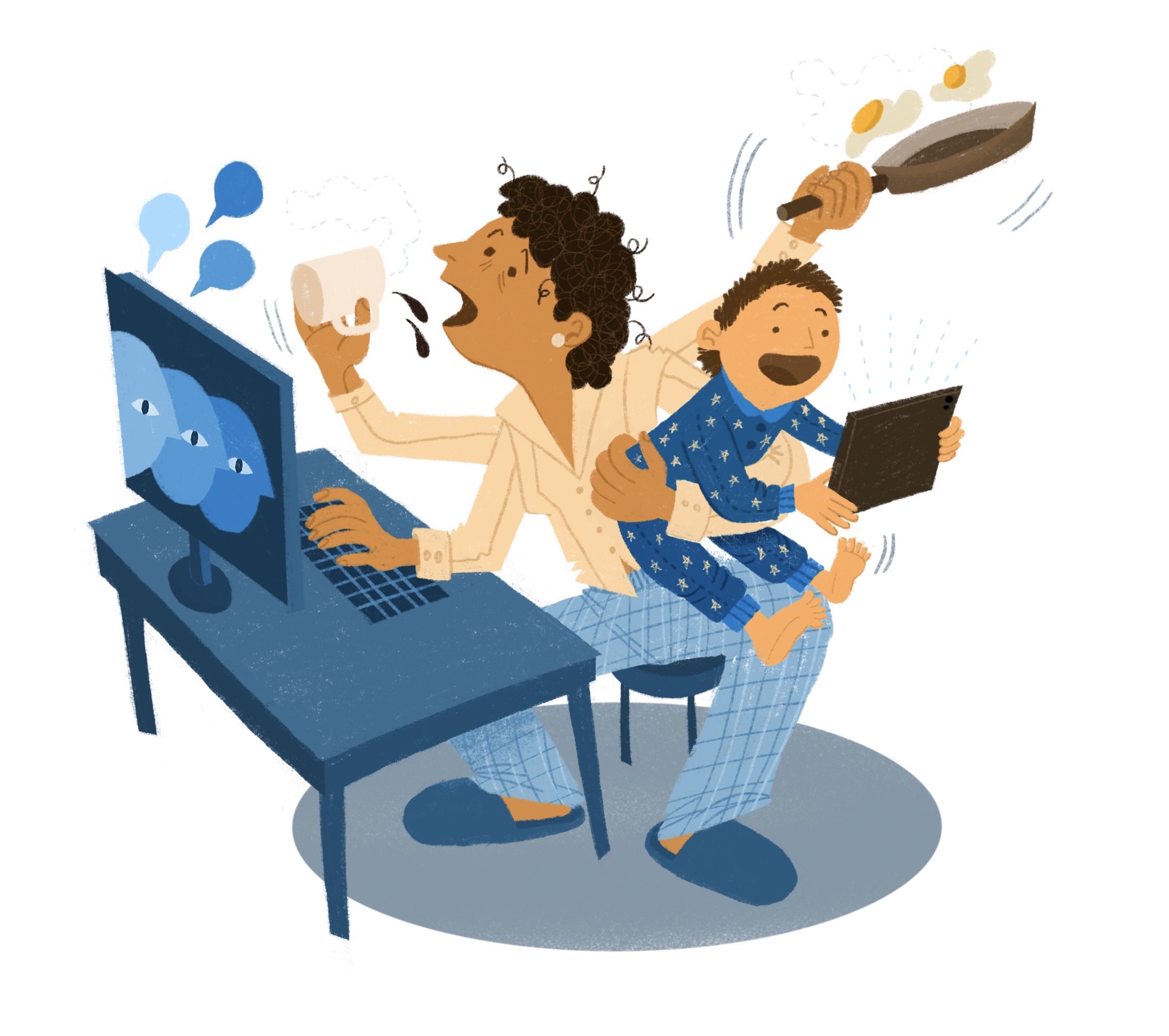A previous version of this story misstated Professor Natalia Mehlman-Petrzela’s last name. It is Mehlman-Petrzela, not Melman-Petrzela.
Even with a stroll through the nearby Prospect Park, Professor Clara Latham’s children, ages three and eight, bounced with energy. Lunch was on the way and they chanted with excitement. Prodding their mother about her phone call, Latham explained she was speaking with a student, in what has become a daily occurrence.
From Brooklyn to Texas, children populate the background of New School Zoom classes, classes that are not their own. The coronavirus and social distancing is forcing professors and students with children to shift between roles intermittently each day, effectively adding their own children to the roster. Parents now facilitate their kid’s education at home, with all involved working overtime. Parents say the adjustment has been difficult while also spawning solidarity.
New York City school buildings have been closed since mid-March, with online classes replacing those formerly in person classes for the remainder of the school year.
Colleges and universities across New York City have also closed their doors and moved towards remote instruction. As classes moved online, educators with children said they have had to balance caring for their children while simultaneously instructing their students.
Latham says the juggling process is difficult. An assistant professor of music technology at Lang, Latham says her children are usually in full-time care from 8 a.m. to 5 p.m. each day, allowing her and her partner to work away from her. Now, she and her partner say they’re trying to figure out the balancing act.
“It doesn’t really seem possible for my partner and I to do our jobs,” Latham said.
Without access to a classroom, professors like Latham are attempting to create their own in-home instruction spaces. “I don’t know how I’m going to do it,” Latham said. “We have a basement and I’m going to try to make space in the basement.”
The decision to close school buildings has been met with mixed reactions. City Council Speaker Corey Johnson and United Federation of Teachers President Michael Mulgrew urged the closures for public safety, while Councilmembers Brad Lander and Ritchie Torres called for a middle ground with the understanding that the childcare provided by schools is essential to workers on the front-line.
Latham, whose 8-year-old attends elementary school in Clinton Hill, shared a similar view. “I actually don’t think they should have closed schools earlier,” Latham said, saying an earlier closing “could have risked kids getting hurt.”
For Nicholas Whitfield, a product design major at Parsons, the safety of his 3-month-old daughter Lola was paramount. Whitfield, 35, and his wife had been closely monitoring outbreaks of COVID-19 around the world ever since Lola was born during the first week of January. In March, the family decided it was best to pack up a van and drive from Brooklyn to a family home in Marfa, Texas. Whitfield now spends his final semester at Parsons online with Lola strapped to his chest.
Whitfield says he bases his daily schedule around Lola, waking up around 6 a.m. each day to care for her. Second to that is Whitfield’s twice a week capstone class meetings, his only class.
Before their departure for Texas, Whitfield said the conundrum of childcare as his wife went back to work was stress-inducing. “We don’t have family in New York, so we were dealing with a lot of anxiety about what would happen once she went back,” Whitfield said, adding that he would hurry home from his six-hour thesis classes on Monday and Thursday.
The couple was considering flying their parents to New York to help with childcare. Now, the presence of family in Texas eased the burden.
The significance of having a child certainly changed his family’s life, but it was not the primary upending factor in Whitfield’s life. “Having a kid has affected it a lot less than the virus has,” Whitfield said. “She’s so young and small, she naps a lot anyways and she’s able to be put down in her bassinet.”
The production of Whitfield’s capstone project, eyewear made out of coffee grounds, has remained steady, Lola and COVID-19 permitting. “Having a baby on a Zoom call isn’t that bad until she freaks out,” said Whitfield, “She’s not to be trusted in the house though, she would probably throw a party.”
With Lang associate history professor Natalia Mehlman-Petrzela’s elementary aged children at home, she had to get creative to keep her children occupied and learning. With the help of fellow parents and their respective expertise, Mehlman-Petrzela’s kids were engaged in a homemade curriculum. Consisting of photography, history, and music lessons, Mehlman–Petrzela’s kids used these Zoom enrichment sessions to virtually connect with their classmates. “This structure helped enormously with their disorientation in a very difficult moment,” Mehlman-Petrzela told the New School Free Press via email.
New School professors attempted to adapt to the imperfect situation through online training and extensive department and school-wide meetings. “I am glad so many devoted educators are working hard to transfer to remote learning ASAP,” Mehlman-Petrzela said, “But I also think it is important to remember that not even a perfectly designed online course – whatever that means- will not magically remedy the many challenges students and faculty face right now.”
As professors take into account and adjust their courses to student logistics, they themselves grapple with their own work as educators. “It is very hard to work effectively without an office or a block of time when my children are occupied, outside the house, with school and activities,” Mehlman-Petrzela said.
In the face of uncertainty, Mehlman-Petrzela offered wisdom to fellow educators and parents. “So little is predictable right now that I am taking it day by day, prioritizing what must get done and trying not to obsess over what, at this point, simply cannot be accomplished.” Emphasizing the importance of the collective, Mehlman-Petrzela said, “We, and I mean that in the ‘it takes a village’ sense, will all need to support one another!”







